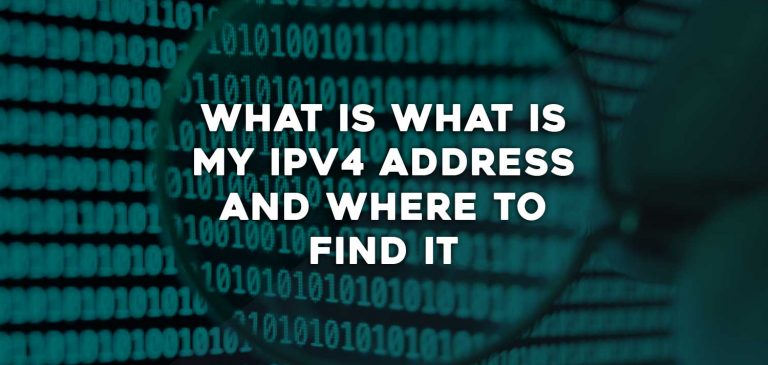Ever wondered how websites know where you are, even before you tell them? It all starts with your IP address. An IP address is a unique set of numbers which is assigned to your device when you connect to the internet. The most common type is the IPv4, which looks something like 192.168.0.1. This digital label helps websites know where to send the data you request. But it also reveals more about you than you might think. Understanding My IP Address in IPv4 is key to protecting your privacy and staying safe online. Let’s explore why that matters more than ever today.
What is My IP Address in IPv4?
An IPv4 address is a series of numbers that form a unique identifier of your device on the Internet. It resembles that of 192.168.1.1, and it makes your phone or computer act similarly to a house number. The address enables websites and services to push information to your machine.
You will find your IPv4 address when submitting a query via a web browser and typing: What is my IP. This is the address which you use every time you log onto the internet through your Internet Service Provider (ISP).
When you buy IPv4 address, it is important to look for the IP address. Finding your IP address may be helpful in creating home networks, in troubleshooting problems, or in destination-based services. It is little, but it is so significant in the relations and communications that take place on the Web.
Procedure of How an IP Address is Assigned
When you go online, the device on which you are connecting your internet requires an IP address to communicate with the sites or services. Your Internet Service Provider (ISP) is giving you this address. In this case, the ISP will tell you the number of your IPv4 using a system referred to as DHCP (Dynamic Host Configuration Protocol). Depending on your setup, it can be temporary (dynamic) or fixed (static).
Most of the home users are also assign with dynamic address when they lease IPv4 address. Businesses, on the contrary, will demand fixed addresses to be stable. It only takes seconds and goes on in the background each time you connect to a network. This step is necessary because our device would not be able to convey or receive any information on the internet without it.
Masking Your IPv4 Address: Tools and Techniques
The IPv4 address will help in keeping you anonymous online. It covers your actual IP address to prevent others from accessing your location and activity in any way. A very popular option for concealing your IP is to use a Virtual Private Network (VPN). How VPNs work protects your identity by bypassing your traffic via a different server that will transfer a new IP.
Proxy servers have the exact mechanism. Alternatively, you can install the Tor browser, which serves the same purpose but can be sluggish. They are not difficult to establish, and they ensure that your information is not accessed in a manner that is not desired. Without a masked IP, you have no control over your digital footprints. It keeps your online life more secure when you are browsing, working or streaming what you want.
Why IPv4 Privacy is Becoming a Premium Concern?
In recent days, people are more concerned with the ability of others to know their IP address and their activities. When you purchase IPv4 addresses, know that your IPv4 can show the general information about your location and your everyday use of the web. It can be suitable to use by advertisers, hackers, and Wi-Fi networks that are open to everyone. As threats against privacy increase, it has risen to more than a technical concern; it is a personal concern to guard your IP.
Smartening of digital tools means that your data is getting increasingly valuable. This is the reason why a lot of users are now willing to purchase VPNs or privacy services. These are used in keeping your online identity secure and your privacy. In the connected world, it is just intelligent digital self-defence to take care of your IPv4 privacy.
FAQs: Common Questions People Often Ask
1. Can my IPv4 address show my location?
Not exactly. Depending on your ISP, it might display your city or region, but not your (street) address or home.
2. How to get my IPv4 address display in advertisements on websites?
Your IP leaks your location and ISP, which will assist advertisers in targeting ads when you live, depending on the ISP you use or the area you browse.
3. Can I secure my privacy if I change my IP?
Yes. We can hide our identity on the Internet with the help of a VPN, proxy, or simply resetting the router (in the case of dynamic IPs).
4. Do I have a permanent IPv4 address?
No, at least not until you opt to take a dynamic IP as a paid service. Most users possess dynamic IPs that are changed over time.
5. Can someone hack me using only my IP address?
It is possible and unusual. There is a list of most attacks that need other vulnerabilities than revealed IP, but it can be an opening for dedicated attacks.
Secure Your Digital Identity with Trusted IPv4 Resources
Looking for reliable, private IPv4 blocks for your business or secure browsing needs? IPv4 TradeHub connects you with premium IPv4 leases, sales, and managed IP services. Whether you’re a startup, data centre, or privacy-conscious individual, we provide tailored solutions to ensure your online operations stay private, fast, and unrestricted. Don’t let outdated or exposed IPs risk your security.
